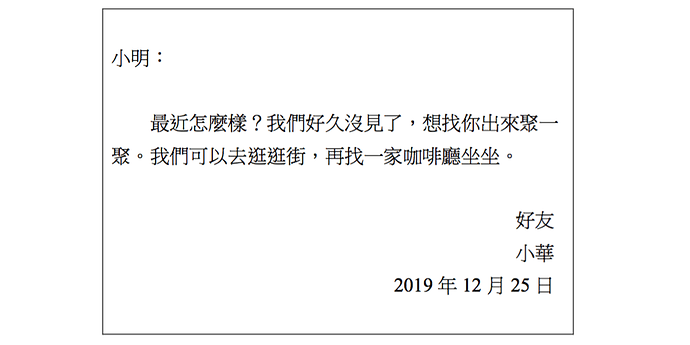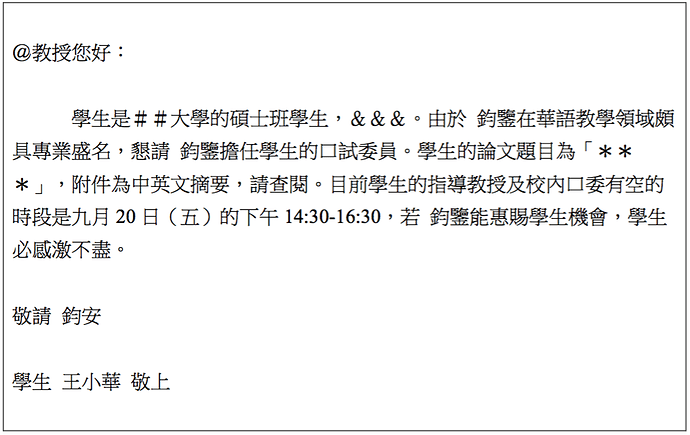Hi there,
Sorry for the late reply. It does take time to make the Chinese e-mail format clear in words. Let’s break things down to make it easier to understand.
-
Structure of the e-mail
It’s almost the same as how Western e-mail: Salutation → Content → Blessing → Signature
-
Punctuations
We use “!” in Chinese to express one’s hyper feelings. So it’s fine to say “你好!” or “你好。” By the way, don’t use “!” too much, or people might think we’re too excited. In addition to that, among close friends and teenagers, people often use “~” to soften their tone. But, of course, we neither use it in a formal e-mail nor use it too often.
-
Salutation (Let’s learn each part one by one)
A. Format: Align Text to the Left
B. Words to use:
a. A close friend or cousin/sibling: Just write down his/her name and put “:” after it. For example, 小明:
b. To an unfamiliar person or older relative: Address him/her by his/her title and put “:” after it. For example,
阿姨[āyí] aunt,
同學(同学)[tóngxué] classmate,
經理(经理) [jīnglǐ] manager.
We can also mention his/her last name or full name in front of the title.
c. Be formal: Add a description ahead of the title. For example:
敬愛的(敬爱的)[jìng’ài de]respected and beloved,
親愛的(亲爱的)[ qīn’ài de] dear,
尊敬的[zūnjìng de] respected
d. Be extremely formal: If we are writing to our boss or professor, we need to add a specific word, which would be different from the recipient to the recipient, after the title. For example,
@@公司人事部經理 ### 先生大鑒
(@@公司人事部经理 ### 先生大鉴)
[@@ gōngsī rénshì bù jīnglǐ ### xiānsheng dà jiàn]
to Mr. ###, HR Manager at @@ Company
@@中學 ### 校長道鑒
(@@中学 ### 校长道鉴)
[@@ Zhōngxué ### xiào zhǎng dào jiàn]
to Principal ### from @@ Middle School
鑒 (鉴) [jiàn] means “to read (mail)”
大 (大) [dà] and 道 (道) [dào] here means “respectfully”. We put these words in front of鑒 (鉴). Besides, when writing to different types of people, we use different words. The following words are the common ones that people often use:
大 (大) [dà] to those being the same age as you are, e.g. colleagues.
鈞 (钧) [jūn] to those elder than you or those work in politics and military, e.g. older colleagues, members of parliament, and admirals.
青 (青) [qīng] to those younger than you, e.g. younger colleagues.
道 (道) [dào] to those work in a school or academic area, e.g. teachers, professors, and principals.
禮 (礼) [lǐ] is used when writing a condolences letter.
e. To those unfamiliar or unknown people:
您好 (您好) [nín hǎo] to one person.
敬啟者 (敬启者) [jìng qǐ zhě] used in an official document.
各位好 (各位好) [gèwèi hǎo] to many people.
- Content
A. Format: 2 spaces (2 Chinese characters) from the left margin.
B. Words to use: (We use the following common words in a formal letter. Which means that we don’t use them between friends.)
a. Family members:
家父 [jiāfù] my dad (家originally means “home”, but here it means “my”.)
家母 [jiāmǔ] my mom
家兄 [jiāxiōng] my older brother
家姐 [jiā jiě] my older sister
舍弟 [shè dì] my younger brother (舍originally means “home”, but here it means “my”.)
舍妹 [shè mèi] my younger sister
小犬 [xiǎoquǎn] my son
小女 [xiǎonǚ] my daughter
令尊 [lìngzūn] your dad
令堂 [lìngtáng] your mom
令兄/弟/姐/妹 your siblings
令郎 [lìngláng] your son
令嬡 (令嫒) [lìng’ài] your daughter
b. Mention the organization
敝校 [bì xiào] my school (敝originally means “broken”, but here it means “my”.)
敝公司 [bì gōngsī] my company
敝單位 (敝单位) [bì dānwèi] my department
貴校 (贵校) [guì xiào] your school (貴originally means “precious”, but here it means “your”.)
貴公司 (贵公司) [guì gōngsī] your company
貴單位 (贵单位) [guì dānwèi] your department
c. Mention yourself
In a formal letter, we rarely say “我 [wǒ] I”. Instead, we say “the role”. For example, if I am writing a letter to a teacher, “I” would become “學生 (学生) [xuésheng] student”. If it’s a letter to my boss, “I” would become “職員 (职员) [zhíyuán] employee”.
C. Structure of the content:
a. At the beginning:
If we’re quite close to whom we are writing, we show our care at the beginning. For example,
好久不見,近來可好?
(好久不见,近来可好?)
[Hǎojiǔ bùjiàn, jìnlái kě hǎo?]
Long time no see. How are you recently?
近來天氣轉涼,@@身體可好?
(近来天气转凉,@@身体可好?)
[Jìnlái tiānqì zhuǎn liáng, @@shēntǐ kě hǎo?]
It’s cold recently. How is your body?
On the other hand, if we are writing an e-mail to a boss or a client, we introduce ourselves and get to the point instead.
b. At the end:
If we address the recipient as敬啟者 (敬启者) [jìng qǐ zhě] at the beginning, we use此致 [cǐzhì] to end the content of the letter.
- Blessing
A. Format: There are three formats you can use. Take 敬祝 事事順心 (敬祝 事事顺心) [Jìng zhù shì shì shùnxīn] “Wish you everything goes well” for example.
(1) Put 敬祝 on a new line with 2 spaces (2 Chinese characters) from the left margin. And put 事事順心 on a new line aligned to the left margin.
(2) Put 敬祝 at the end of the last paragraph without a period after it. And put 事事順心 on a new line aligned to the left margin.
(3) Put敬祝 事事順心 on a new line aligned to the left margin with a space between敬祝and事事順心.
B. Words to use:
We break the blessing into two parts, “to wish” and “the blessing”. And, as usual, we use different words to different types of people.
a. “to wish”
There are a bunch of words to use, but I think it’s too frustrated to learn all of them; therefore, I only list the most common ones. By the way, 敬請is more respectful than祝.
祝 [zhù]
敬請 (敬请) [jìng qǐng]
b. “the blessing”
(1) common blessings:
事事順心 (事事顺心) [shì shì shùnxīn] Everything goes well.
身體健康 (身体健康) [shēntǐ jiànkāng] Good health.
平安喜樂 (平安喜乐) [píng’ān xǐlè] Safe and happy.
(2) Formal blessings:
大安 (大安) [dà’ān] to those being the same age as you are, e.g. colleagues.
鈞安 (钧安) [jūn’ān] to those elder than you or those work in politics, e.g. older colleagues, members of parliament, and politicians.
道安 (道安) [dào’ān] to those work in school or academic area, e.g. teachers, professors, and principals.
禮安 (礼安) [lǐ’ān] is used when writing a condolences letter.
- Signature
A. Structure: Role → Name → To write → (Time) → (Department)
B. Format:
a. In a paper letter
“The name” and “to write” are on the same line and there’s a space between them. Others are on different lines. Besides, each line is aligned to the right margin. “The role” is at the upper left of the name; moreover, the font size of “the role” should be decreased a bit.
b. in an e-mail
“The name” and “to write” are on the same line or different lines and there’s a space between them. Other information is on a new line. And they are all aligned to the left margin.
C. Words to use:
a. Role:
If I am writing a letter to a teacher, then before my name, there would be “學生 (学生) [xuésheng] student”. If it’s a letter to my boss, then it would be “職員 (职员) [zhíyuán] employee”. But if it’s a letter to my friend, I can just omit this part. Additionally, if it’s a letter to my lover, it can be “愛你的 (爱你的) [ài nǐ de] the one loving you”.
b. To write:
If it’s a letter to friends or family members, we can also omit this part.
上 [shàng] and啟 (启) [qǐ] to those being the same age as you are, e.g. colleagues.
敬上 [jìng shàng] and敬啟 (敬启) [jìng qǐ] to the elder, the boss, or those who are not close with.
c. Time:
In a paper letter, we put the time after the things mentioned above, while in an e-mail, since there’s time on every e-mail already, we can omit this part. Besides, if it’s a letter to a Chinese, note that the order is “year, month, day”.
d. Department:
If it’s an e-mail sent from a business-email-address, then the email should be closed by some contact information, e.g. the company, the department, phone number.
e.g.1 A letter to a friend.
e.g.2 A letter to a professor.




